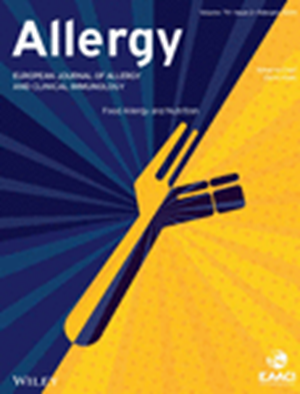肥胖损害皮肤屏障功能,促进小鼠过敏致敏。
IF 12
1区 医学
Q1 ALLERGY
引用次数: 0
摘要
特应性皮炎是一种以强烈瘙痒和皮肤屏障减弱为特征的慢性炎症性皮肤疾病。受损的皮肤屏障通常会导致过度的免疫反应和对过敏原的更大敏感性。先前的研究已经暗示了肥胖和特应性皮炎之间的联系;然而,将肥胖与特应性反应联系起来的机制尚不清楚。我们认为肥胖损害皮肤屏障功能,促进过敏原在皮肤中的渗透,引发全身和局部过敏致敏。我们使用饮食诱导的肥胖小鼠模型来检查稳态和炎症条件下的皮肤屏障完整性和免疫反应。为了诱发皮炎或食物过敏,我们分别外用MC903或卵清蛋白。我们观察到肥胖显著改变了皮肤屏障生理学,正如肥胖动物经皮失水增加所表明的那样。随着时间的推移,我们观察到关键的皮肤屏障蛋白的减少——在明显的皮肤炎症之前,进一步表明肥胖期间屏障完整性的丧失。有趣的是,皮肤屏障的破坏与微生物组的变化无关。在细胞水平上,免疫分析揭示了向17型辅助性t细胞反应偏倚的转变,尽管这种转变与稳态条件下细胞因子产生的增加不一致。与瘦动物相比,在肥胖动物中局部应用MC903会导致耳朵肿胀增加和明显的th17偏倚炎症反应。我们的研究结果表明,肥胖削弱了皮肤屏障,促进了过敏原渗透和过敏致敏。肥胖动物中th17扭曲的免疫环境也可能放大对过敏原的炎症反应,并作为一个前馈回路进一步分解皮肤屏障。这项研究强调了肥胖引起的皮肤屏障功能障碍如何导致过敏性疾病,如特应性皮炎,并可能通过屏障修复来治疗。本文章由计算机程序翻译,如有差异,请以英文原文为准。
Obesity Impairs Skin Barrier Function and Facilitates Allergic Sensitization in Mice.
Atopic dermatitis is a chronic inflammatory skin condition marked by intense itching and a weakened skin barrier. The compromised skin barrier often leads to exaggerated immune responses and greater sensitivity to allergens. Previous studies have already implicated a link between obesity and atopic dermatitis; however, the mechanisms linking obesity to atopy are not yet well understood. We propose that obesity impairs skin barrier function, facilitating allergen penetration in the skin and triggering systemic and local allergic sensitization. We used a diet-induced obesity mouse model to examine skin barrier integrity and immune responses in both steady-state and inflammatory conditions. In order to induce dermatitis or food allergy, we epicutaneously applied MC903 or ovalbumin, respectively. We observed that obesity significantly alters skin barrier physiology, as indicated by increased transepidermal water loss in obese animals. Over time, we observed a decrease in key skin barrier proteins-preceding overt cutaneous inflammation, further indicating a loss of barrier integrity during obesity. Interestingly, skin barrier breakdown was independent of changes to the microbiome. On a cellular level, immune profiling revealed a shift towards a type 17 helper T-cell response bias, although this shift did not coincide with an increase in cytokine production under steady-state conditions. Topical application of MC903 in obese animals led to increased ear swelling and a pronounced Th17-biased inflammatory response compared to lean counterparts. Our findings show that obesity weakens the skin barrier, facilitating increased allergen penetration and allergic sensitization. The Th17-skewed immune environment in obese animals may also amplify inflammatory responses to allergens and act as a feed-forward loop to further disintegrate the skin barrier. This study highlights how obesity-induced skin barrier dysfunction contributes to allergic conditions like atopic dermatitis and may be therapeutically targeted by barrier restoration.
求助全文
通过发布文献求助,成功后即可免费获取论文全文。
去求助
来源期刊

Allergy
医学-过敏
CiteScore
26.10
自引率
9.70%
发文量
393
审稿时长
2 months
期刊介绍:
Allergy is an international and multidisciplinary journal that aims to advance, impact, and communicate all aspects of the discipline of Allergy/Immunology. It publishes original articles, reviews, position papers, guidelines, editorials, news and commentaries, letters to the editors, and correspondences. The journal accepts articles based on their scientific merit and quality.
Allergy seeks to maintain contact between basic and clinical Allergy/Immunology and encourages contributions from contributors and readers from all countries. In addition to its publication, Allergy also provides abstracting and indexing information. Some of the databases that include Allergy abstracts are Abstracts on Hygiene & Communicable Disease, Academic Search Alumni Edition, AgBiotech News & Information, AGRICOLA Database, Biological Abstracts, PubMed Dietary Supplement Subset, and Global Health, among others.
 求助内容:
求助内容: 应助结果提醒方式:
应助结果提醒方式:


